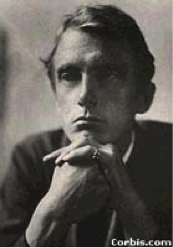 Phillip Edward Thomas is one of the names on a slate stone in Poet’s Corner, Westminster Abbey, which commemorates the sixteen “Great War Poets”. It is alongside the likes of Wilfred Own and Rupert Brooke, so Thomas’s name will therefore be immortalised as a war poet although most of his work was written before he ever went to war. In fact his time at the front was tragically short – he was killed at the Battle of Arras very soon after arriving in France in 1917.
Phillip Edward Thomas is one of the names on a slate stone in Poet’s Corner, Westminster Abbey, which commemorates the sixteen “Great War Poets”. It is alongside the likes of Wilfred Own and Rupert Brooke, so Thomas’s name will therefore be immortalised as a war poet although most of his work was written before he ever went to war. In fact his time at the front was tragically short – he was killed at the Battle of Arras very soon after arriving in France in 1917.
Born into a mostly Welsh family in March 1878, Thomas grew up in Lambeth and went to grammar school in Battersea, South London before studying at Lincoln College, Oxford. He married young, while still an under-graduate, and spent his time reviewing books and writing his own stories and poems. He became known as a writer on countryside matters while also writing biographies and worked at the Daily Chronicle in London as a literary critic. He found time to publish a novel in 1913 called The Happy-Go-Lucky Morgans.
He had a deep respect for poetry and regularly wrote reviews of it, yet did not take it up seriously himself until 1914 and his first efforts were published under the nom de plume Edward Eastaway. He wrote in a colloquial style, evoking the glories of the English countryside while contemplating the horrors of war that were to come. All of his war poems were written BEFORE he set foot in France and all in a tone of extreme melancholy. Take, for example, This Is No Case Of Petty Right Or Wrong which he penned in 1916. He was considering who is right, who is to blame and clearly seeing the German Kaiser as the hateful villain of the piece:

Like so many men of the time he felt compelled to enlist in the Army even though, as a married man of 37, he was not obliged to do so. Thus he joined the Artists Rifles in July 1915. It is generally regarded that he came to his decision having read fellow poet Robert Frost’s great poem The Road Not Taken.
He went to France as a commissioned officer of the Royal Garrison Artillery and met his end in curiously tragic circumstances on Easter Monday, April 1917. Having survived the bloody Battle of Arras he stood casually in his trench to light his pipe. A late, random shell burst near to him and the concussive blast wave from it was so strong that the force of it killed him where he stood.
Edward Thomas’s body was taken to the Military Cemetery at Agny in France and here he lies amongst the many rows of fallen soldiers. He left behind his wife Helen and two daughters and so consumed by grief was Helen that she sought solace in writings of her own. She published an account of their early years together called As it Was (1926) with a second volume following in 1931 called World Without End.

